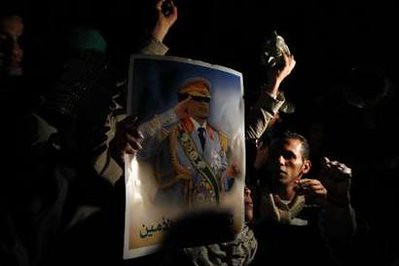
Libyans supporting the government against the imperialist airstrikes in a mass demonstration on March 20, 2011. In Greece the Communist Party youth wing has protested the attacks and the Greek government's role in the genocidal attacks., a photo by Pan-African News Wire File Photos on Flickr.
NATO deal leaves U.S. still commanding Libya strikes
4:32pm EDT
By David Alexander
WASHINGTON (Reuters) - A NATO decision to take charge of a no-fly zone over Libya does not include conducting air strikes against Muammar Gaddafi's ground forces, a mission that will remain in U.S. hands until a new command deal is reached, Vice Admiral Bill Gortney said on Friday.
Gortney, chief of the U.S. military's Joint Staff, said the U.N.-backed operation against Gaddafi's forces involved three different missions -- an arms embargo, a no-fly zone and protecting Libyan civilians.
He said the U.S. military initially assumed command of all three missions in order to quickly implement the U.N. resolution authorizing the action. But President Barack Obama and other U.S. officials made it clear the United States would hand off control of the operation as soon as feasible.
The Western alliance already has assumed control of the arms embargo, led by an Italian vice admiral, and has agreed to take over the no-fly zone in coming days, Gortney said. But there is disagreement over the third mission, which includes air strikes to stop Gaddafi from attacking his opponents.
"This mission will remain in U.S. hands until such time as the coalition is ready to assume it," Gortney told a briefing at the Pentagon. "My expectation is that it, too, could fall under NATO. But ... these are decisions and discussions ongoing at the political level and I just would not speculate right now where it will end up."
Gortney said the coalition had fired 16 Tomahawk missiles and flown 153 air sorties in the past 24 hours, 96 of which were attack-related and not exclusively patrolling the no-fly zone.
"Most of these strikes were not pre-planned but rather targets of opportunity, meaning that we responded to threats as they were occurring or that a new target presented itself as vulnerable and important to hit at that time," he said.
The strikes were directed at command and control facilities and Scud missile garrisons around Tripoli as well as air defense systems in the south. They also targeted Libyan tanks preparing to fire on the city of Ajdabiya, he said.
Coalition forces were mainly using precision weapons -- Tomahawk cruise missiles or laser-guided or GPS-guided bombs. Responding to a question, Gortney said he was unaware of any use of depleted uranium munitions in Libya.
Depleted uranium munitions are effective at penetrating armor because of their high density, but they are controversial because they raise long-term health concerns.
Gortney noted reports that Gaddafi was arming civilian volunteers to fight his opponents and said coalition attacks were eroding his ability to exercise command of his forces.
"Gaddafi has virtually no air defense left to him and a diminishing ability to command and sustain his forces on the ground," Gortney said.
"His air force cannot fly. His warships are staying in port. His ammunition stores are being destroyed. Communication towers are being toppled and his command bunkers are being rendered useless."
(Editing by Christopher Wilson)
1 comment:
must hear interview on Libya:
Gerald Perreira speaks: hear the man who wrote excellent articles on Libya:
http://www.blockreportradio.com/radio-mainmenu-27/1065-an-pan-african-view-on-libya-and-qadafi.html
Post a Comment